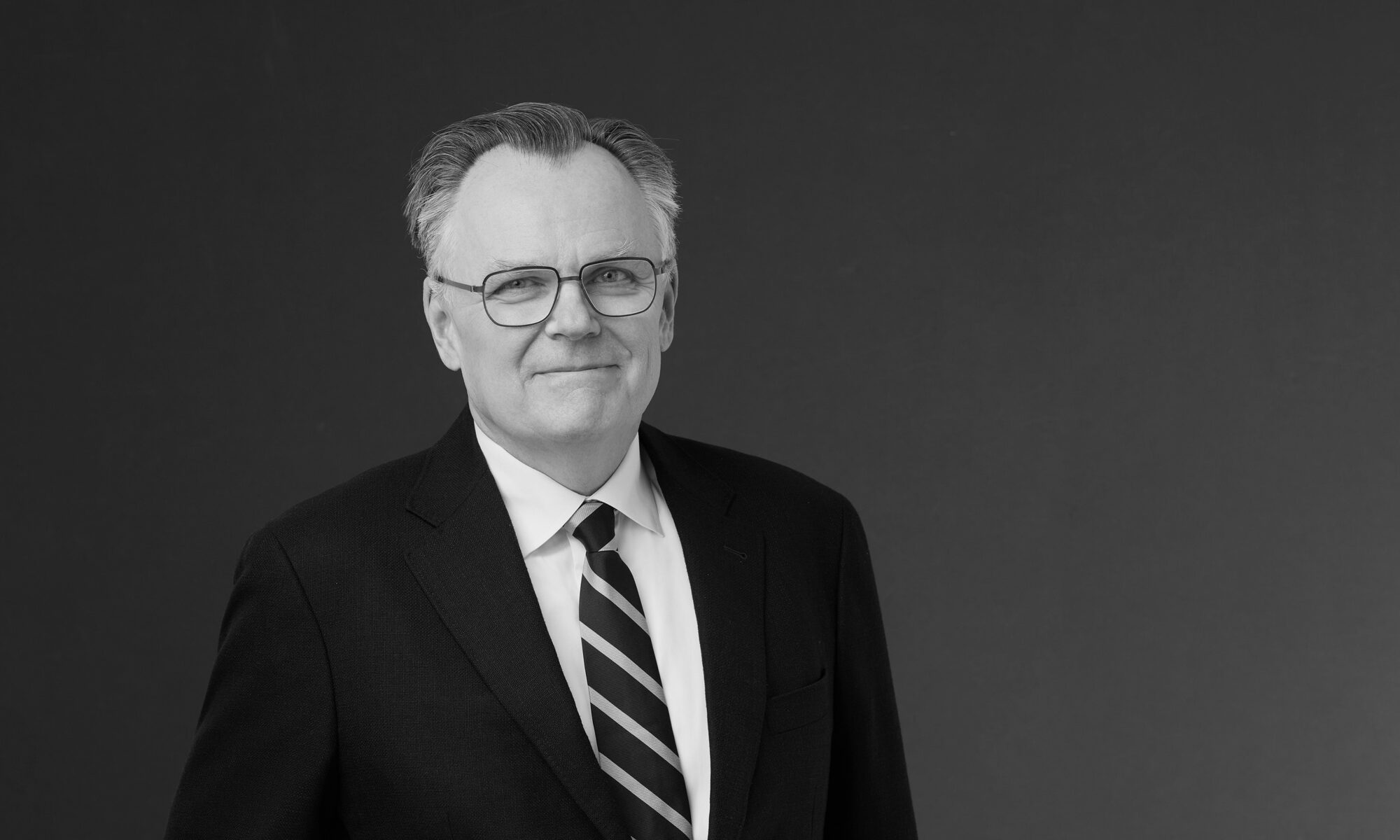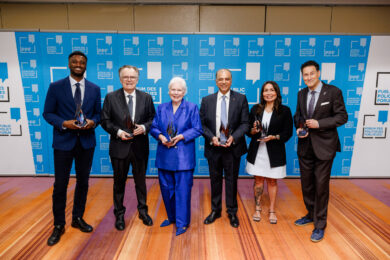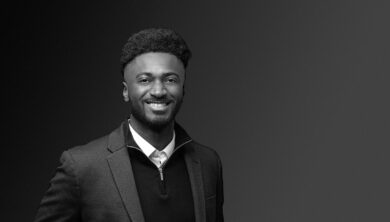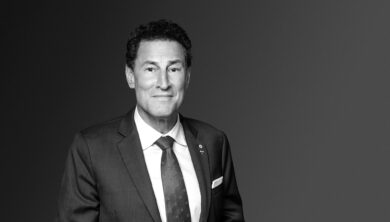
Marc-André Blanchard — 2025 Testimonial Dinner Award Honouree
“We all need to create partnerships that are novel and innovative. It takes different views. And it takes different people around the table.”
Marc-André Blanchard has always had two professional lives. One in the private sector. The other in the public sector — sometimes behind the scenes and other times, front and centre, such as from 2016 to 2000 when he was the Ambassador and Permanent Representative of Canada to the United Nations in New York.
It’s a combination of skills, interests and experience that make Blanchard a valuable commodity on the global stage, where he’s known for bringing together the public and private sectors, philanthropists, governmental agencies and NGOs to finance and implement important initiatives.
Currently, that skill is on full display.
The executive Vice-President and Head of CDPQ Global, the second largest global investment group with net assets of $473 billion in 70 countries, describes the work of the institutional investor as “a form of policy because we have a dual mandate — the return to the depositor but also the return to the economic development of Quebec. And we believe because of that, we are one of the most innovative investors in the world that believes in the strength of communities.”
Infrastructure is a focus of CDPQ investment, such as the Réseau express métropolitain (REM), a light rain transit system around Greater Montreal. “Imagine a pension fund being the designer, the developer, the constructor and the operator of a light rail transit system. We got there because of our dual mandate,” he explains.
CDPQ is also part of the recently announced consortium for Canada’s largest infrastructure project, a high-speed passenger train along the Toronto-Quebec City corridor. “To be selected by Canada to do that, to accelerate the integration of our country, is very exciting,” he says.
Last year, Blanchard was tapped to be co-chairman of the prestigious UN Foundation in Washington, D.C., sitting alongside entrepreneur Ted Turner and Her Majesty, Queen Rania of Jordan, among other international luminaries, working to help solve world problems. Blanchard’s resume was tailor-made for the position. “It was a nice recognition,” he says of the UN Foundation appointment. “I had the private sector experience and the governmental experience and the multilateral experience. I’m very proud of that.”
His engagement in public life began as a child, growing up in St. Zotique, Que., a small village of 1,500 people west of Montreal. “I come from a family that always put community service and public service high on the agenda,” he explains. His father, a lawyer, was the mayor of the village. The family started a nursing home that his only sibling, an older brother, now owns and runs. His mother, who didn’t have much education, “could lead an army,” he says with a laugh. “She is a force, and from her, I learned that you needed everyone to make something happen.”
“This is the first time we’re trying to do this as a world. A lot of people have set themselves some objectives without having a clear idea of how they’re going to get there. But that’s not a problem. Let’s all sit down and figure out how to get there that’s not shooting at each other.”
At the Université de Montreal, where he studied law, Blanchard was inspired by professors such as economist and former Quebec premier Jacques Parizeau, and politician and diplomat Stéphane Dion. He went on to earn multiple degrees outside Canada: a master’s in public international law from the London School of Economics followed by a joint master’s in public affairs and international relations from Columbia University in New York.
“At first in my life, I was more interested by politics. But then I became more inspired and way more focused on policy,” he explains as he traces what he calls his evolution.
Part of that shift happened when he was at Columbia University and interning at the United Nations, working with the Republic of the Marshall Islands in their first year of becoming a sovereign nation. He also interned at the Robert F. Kennedy Human Rights organization alongside fellows involved in the rule of law in Kenya. “I was very focused at first on the importance of governance, the rule of law, and that brought me on the policy side,” he explains. “I thought, ‘What are the policies needed to actually have in some countries, such as Kenya at the time, to make sure that there was sustainable peace and a respect of human rights?’”
He realized that “policy is where I could have the greatest influence.”
From early on in his law career, he was involved in Quebec politics, helping to determine the best path forward for the province. For the 1995 Quebec referendum, while working in a boutique law firm, he started a group of young professionals, entrepreneurs and academics, arguing that “sovereignty of Quebec was not essential nor useful to actually tackle the challenges that Quebec was facing at the time.” Soon after, he became Chair of the Policy Committee of the Quebec Liberal Party. One of his signature accomplishments was pushing for legalized civil union for same sex couples, he notes.
“And then I grew,” he adds, his face lighting up with enthusiasm for his own trajectory. “From all this, I became chair of the Quebec Liberal Party for eight years until 2008.” By that time, he had joined McCarthy Tétrault, where he quickly rose up the ranks to become Chairman and CEO in 2009. It wasn’t until 2015 that he became involved in politics again as co-chair of the transition team of Prime Minister Justin Trudeau’s new government.
The following year, Prime Minister Trudeau appointed him ambassador to the UN. During that time, he sat on Canada’s North American Free Trade Agreement (NAFTA) Council. Wary of saying anything perceived as critical of President Trump, with CDPQ having over $200 billion in assets in the U.S., Blanchard comments on the current trade war by saying, “This is a time for us to obviously look at how we can strengthen our own national economy, how we can diversify ourselves, but at the end of the day, geography will never change. The United States will always remain our most important partner and will always hopefully remain our friend.”
While at the UN as Ambassador, Blanchard was primarily focused on how to implement and finance new initiatives such as the Paris Accord and Sustainable Development Goals (SDGs). “If you ask people about what I did at the UN, they will say, ‘This is the guy who brought the private sector to the UN.’ I brought the finance discussion around the table. With the Ambassador from Jamaica, I started the Group of Friends for the Financing of the SDGs and a lot of my efforts during my tenure were focused on the rapprochement between the UN, governments and the private sector to accelerate private capital mobilization. … It was an important reform of the UN without being a formal reform.” He co-chaired summits on financing COVID-19 pandemic measures as well.
“You have companies that have larger market cap than most GDPs of the world,” he says in support of private/public sector collaborations. “At the time when I was at the UN, I remember saying that if Amazon was a country, it would be the size of Canada, economically speaking. And so, we needed to resolve climate change, to resolve the issue of inequalities and the SDGs. You need to bring to the table the people who control the technology, then the finance, then the resources, the civil society, everybody.”
“[Breaking the silos] has been a focus of mine. There are silos everywhere. There are silos in government and there were some in my law firm. There were some at the United Nations. There are some at the CDPQ. But to be effective in this world, and with the changes we’ve seen in the last 25 years and now that we’re seeing in an accelerated way, we all need to create partnerships that are novel and innovative.”
In 2000, he joined the CDPQ. “It was a natural [decision],” he says. “It’s an important institution for Quebec and it’s an important institution for Canada. When people were asking me at the UN, ‘What’s the magic recipe for Canada?’ I was always saying, ‘It’s the diversity of our people. It’s natural resources. But it’s also about the strength of our civic institutions, from the pension funds to childcare facilities. It’s the fabric.’”
As global head of sustainability at CDPQ, he has maintained his interest of directing capital toward a greener and more equitable transition not only to protect the planet but also because “we believe it provides better returns. … It’s a question of making sure that we are conscious of the risks but also the opportunities.” Despite potential policy shifts undoing incentives for low-carbon investments, Blanchard doesn’t expect the investment focus to change. “Look at recent events, like the fires in California or Hurricane Debby that brought torrential rains to Quebec last year.”
The goal of reaching Net Zero “may not be straight,” he observes. “This is the first time we’re trying to do this as a world. A lot of people have set themselves some objectives without having a clear idea of how they’re going to get there. But that’s not a problem. Let’s all sit down and figure out how to get there that’s not shooting at each other.”
The final question is an obvious one: Has he considered going into politics?
“I’ve been asked every election,” he confesses. “I’ve said no so far. But life is long.”
Why has he said no? “Look at politics now. It’s very divided, so polarized. For me, I’m a consensus builder. I want to convene people. And that, to me, is what I would find difficult. I’ve always been talking to the other side whether in litigation or in the UN. I always have a close relationship with all my competitors. That’s probably why I would not be the best politician.”





